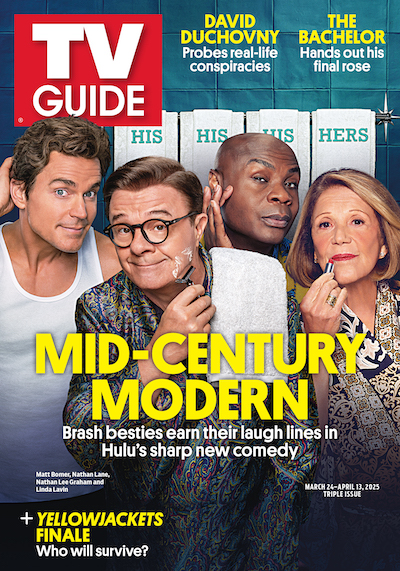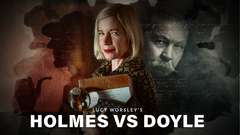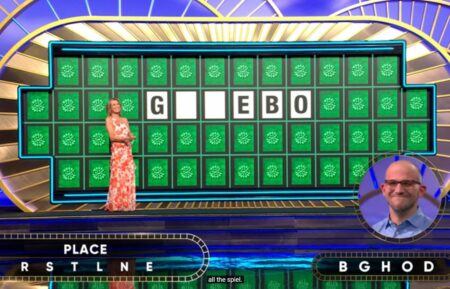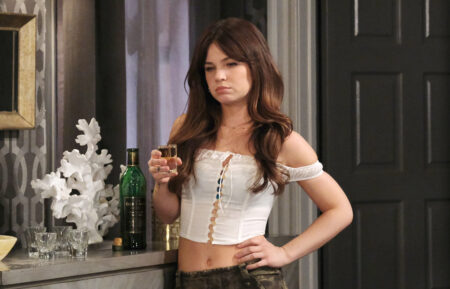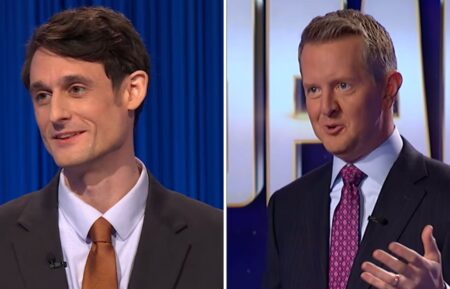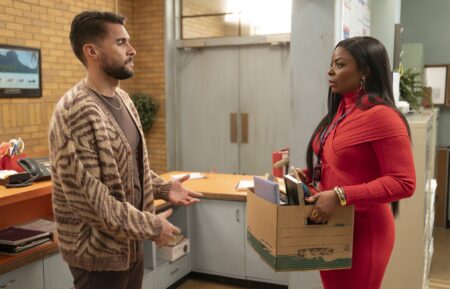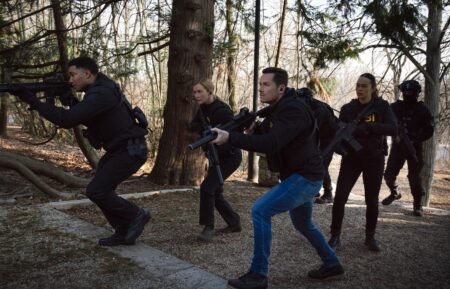Lucy Worsley Admits to Secret Crush & Dishes on ‘Ted Lasso’ Surprise in ‘Holmes vs. Doyle’
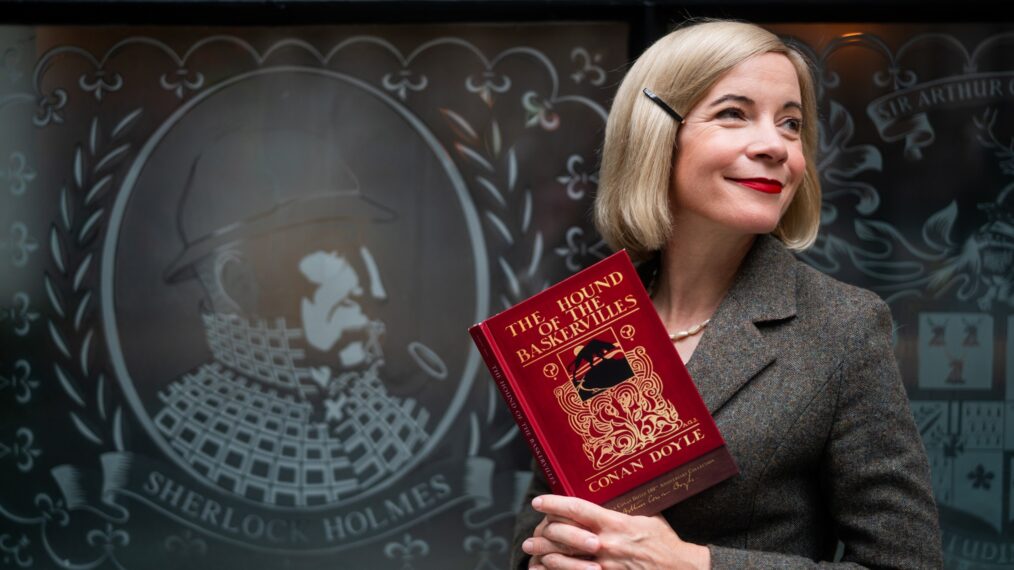
Q&A
PBS fan favorite Lucy Worsley delves into a late 19th Century rabbit-hole for her new show Holmes vs. Doyle. This fascinating three-part series sees the popular British historian on a sleuthing quest for answers to the mystery of why Arthur Conan Doyle came to despise Sherlock Holmes, the iconic character that put him on the map and filled his pockets with money.
Worsley last explored another famed author with a similar internal conflict in Agatha Christie: Lucy Worsley on the Mystery Queen. Here the inquisitive host takes viewers on a journey through the parallel lives of Doyle and his legendary detective. We caught up with the unabashed Holmes fan to talk about her latest adventure.
I know you’re a big fan of Sherlock. How was it getting to really dig into the character and his author on a deeper level?
Lucy Worsley: I’ve got the biggest, weirdest crush on Sherlock Holmes. I’ve had it for a long time. I feel a bit guilty about saying how much I like him because he is a bit of a weirdo, a loner, and doesn’t really like other people. He spends a lot of his time working. I possibly identify with these traits he has. I will say Dr. Watson is clearly a lovely bloke. He loves Sherlock Holmes, so there must be something loveable about him too. He has some redeemable human features. In fact, there is this wonderful moment in one of the stories. Sherlock filled the room with poisonous gas. Dr. Watson pulls him out. Sherlock for the first time says, “I love you, Watson. You saved my life. I shouldn’t have done that. You are a true friend.” It’s a lovely moment because you never have seen Sherlock Holmes being as nice as that.
The series reveals so much about Arthur Conan Doyle, including drug issues, all about his family, even how he judged a bodybuilding contest. Was there any particular part of Doyle’s life that you found especially eye-opening?
That bodybuilding contest. I did not know about that. It’s crazy weird, but it does make sense in the context a lot of people being very interested in building up the physique of British young men at the turn of the century. They wanted to fight in war amid the imperial priorities that were going on. I love learning about the secrets of the family. The shameful secret of his alcoholic father and his time in an asylum.
I don’t think I realized just what status anxiety he had. I think it’s partly why he felt ashamed of the success of Sherlock Holmes. What he saw as trashy disposable fiction was commercially successful, not at all elevated in highbrow. Arthur was very interested in elevated and highbrow because he knew his family was only just clinging to the bottom of being respectable. Just a few little things would have been different if he had not gone to boarding school and gotten a medical education and become a respectable member of the middle class. He couldn’t get enough of status and respectability. It’s like, get over yourself. How much success is enough for you? There is insecurity, isn’t there? He was never comfortable in himself. I guess I can relate to that.

PBS
I think we can all relate at times. When it comes to his mother, she was very influential in his life. Her being a fan of Sherlock drove him mad. I didn’t realize how important she was to Doyle’s story.
She is great. Arthur’s mom was so straightforward. She was like, “Get over yourself Arthur, and your fancy ways. Just accept you have success on your hands here.” He was supporting a lot of people. He had so many siblings and there is only one with any financial success. He was bankrolling all of them and his mom and his wife, who is an invalid, and the two children. The whole thing was snowballing in a way that sometimes is for men who are providing. They see themselves as providers and rainmakers. They put themselves under pressure to keep the money coming. You could never accuse him of being a slacker. He was an absolute workaholic.
What do you think Arthur would have thought about what Sherlock had become? There have been so many TV and film adaptations, even recently with more in development.
I think on the one hand Arthur Conan Doyle would have been devastated if we weren’t watching a biopic of him and his achievements and his adventures around the world. He would also be disappointed we did not all believe in the paranormal. That the spiritual movement hadn’t really caught on in the way he had hoped. On the other hand, although he didn’t really like Sherlock Holmes very much or feel proud of him in any way. If he was getting a lot of money with these products on the screen, then that would have made him quite happy.
He was a very professional writer in that he would write for money and clearly not for the arts. Like when he brought Sherlock back from the dead for example in 1903. He had a conflicted attitude, didn’t he? If it was me, I’d be thrilled that something I created out of my head was still on people’s minds a hundred years later. With Arthur, it wouldn’t have been that straightforward. I think there are other examples of people who have created a brilliant character and got fed up with how that character took off.
It’s similar to being an actor who gets typecasted.
Absolutely. That’s a good analogy. Agatha Christie got fed up with Poirot for example.”He is such a pain. He is so full of himself. He looks ridiculous. I can’t get rid of him because he pays the bills.”
A means to an end. I think Ted Lasso fans will be excited to see Nick Mohammed on the show. That was a fun surprise watching him show you some magic tricks as you delve into Harry Houdini’s connection to Doyle.
We filmed in this music hall in Hackney because it seemed like a lovely environment. He walks in and everyone is like [gasps], but he was there in a completely different capacity. He is actually an expert on Harry Houdini and actually performed a one-man show about him. That was before he became part of the Ted Lasso phenomenon. He was a fantastic contributor and very hands-on with the cards.
You yourself have traveled for shows and filming these great projects. What are some must-haves when you’re on the road?
I’m British, so you might not fully understand this, but I have a tiny little travel kettle. It comes with me particularly when I go to France and America. Now I love France, and I love America, but these are not places that know how to make tea. That’s one essential thing. Also, hand warmers. When I’m out and about filming, I wear the same clothes the whole time so people aren’t getting distracted by my changes in outfits. In some places, it’s really cold and in some places it’s really hot and I have to look exactly the same. You know those stick-on heat pads if you’ve got a bad back? I have those stuck on the inside of my coat and all over my back, particularly if it’s windy.
This year you stepped down as chief curator for the Royal Palaces after 21 years. How do you reflect on your time doing that and making such a difficult decision?
I was conflicted about it. I had the best time there. I was just in Hampton Court today. Everything was so frosty and looking beautiful with all the Christmas decorations. It got me thinking, “Why am I leaving? I must be mad.” It’s an opportunity for personal growth. It’s important to make changes and try new things. We do a podcast for BBC that’s called Lady Killers. A crime history looking at female murderess from the past. That has grown and grown, and it’s all in different countries now. I just didn’t have the time to commit to it as I wanted to. So I’m going to enjoy a life of crime.

Lucy Worsley/PBS
How do you find the work-life balance? Married happily for so long and working on all these things.
I’m terrible at work-life balance. I’m very poor at it. Part of this is all the things I do I really enjoy. Basically, my job is to talk to people about history. Whether it’s being a curator or making television programs. I’ve always loved talking to people about history. So, it doesn’t feel like work to me. At the same time, I should probably be more conscious about introducing other things in my life like cleaning my house and socializing.
Does your husband appreciate what you’re doing? Do you have a critic at home?
My lovely spouse. He is in a very different line of business. It’s quite healthy to have different interests I suppose. He doesn’t like me talking about him in interviews. So excuse me if I appear to dodge the question.
No problem! I get it. What kind of perspective did you walk away with after filming this new docuseries? It’s amazing to me just how much people see Holmes as more than a fictional character.
Sherlock matters a lot to me. I found him weirdly inspirational in my own life. If I’m not well, I listen to a Sherlock Holmes story. He cures me. He puts the world to right. I guess what I learned is I’m not alone. If you go to Baker Street and his house, which isn’t really his house because it’s fiction. But it’s set up like a museum. They get several letters every day addressed to him like he is real. Those people believe in him as I believe in him. Thank you Arthur Conan Doyle for doing that, even though you yourself were cheesed off that that was your legacy.
What’s next for you?
In the new year, January, we have another series coming to PBS called Lucy Worsley Investigates. Not my choice of name as it’s hard enough for me to say my name. We take some big events from British history and explore them. We’ve looked at Jack the Ripper. This is a very refreshing program, I think. Normally, if you watch a program with Jack the Ripper it’s who is Jack the Ripper and his suspects. This program is not about Jack the Ripper like that. He wasn’t a real person but an imaginary construct of a journalist who wrote this fake letter reported to be from Jack the Ripper.
You look at the social conditions of Victorian London, which allowed this idea of Jack the Ripper to become formed. Every day the crew would ask me, “Is today the day you’re going to reveal who the new suspect is of Jack the Ripper?” No! You’re not listening. This is a different kind of program. It’s based on the premise he wasn’t real and in people’s imaginations.
Lucy Worsley’s Holmes vs. Doyle premiere, December 8, 8/7c, PBS
From TV Guide Magazine
How Hulu's 'Mid-Century Modern' Is a 'Golden Girls' for Our Times
Settle in for some older and bolder laughs with the BFFs of a certain age in the new comedy starring Nathan Lane, Matt Bomer, and Nathan Lee Graham. Read the story now on TV Insider.


